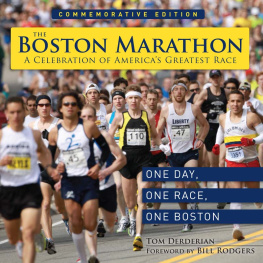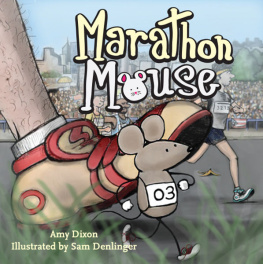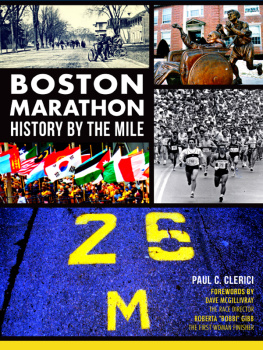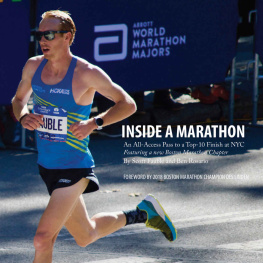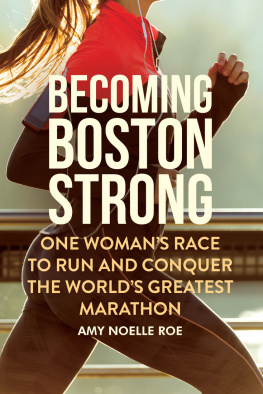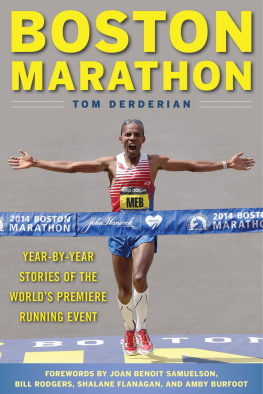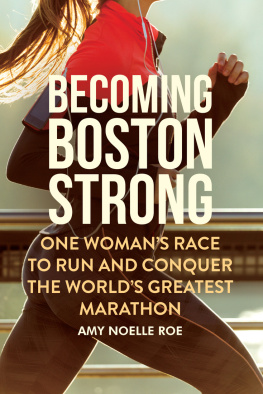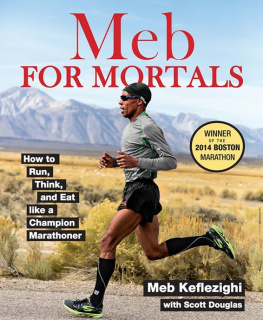Dear Friends,
Patriots Day in the Commonwealth of Massachusetts is a civic holiday which commemorates the Battle of Lexington and Concord, the beginning of the American Revolution, and the spirit of independence and personal determination that gave rise to it. Since 1897, Patriots Day has been celebrated annually with the running of the Boston Marathon, the worlds oldest continually contested marathon. Over 117 years, the Boston Marathon has been witness to the rise of legends in our sport, the exponential growth of the running community, and unforgettable stories of personal triumph.
Each Patriots Day, the strength and resilience of the worldwide running community is on full display as thousands of runners accept the challenge of the 26.2-mile run from Hopkinton to Boston. At the core of this event is the determination that propels each participant through eight cities and towns along the historic course. From many of the worlds best marathoners on a quest for the champions laurel wreath, to runners chasing a personal best or raising funds for local charities, to nearly 500,000 spectators who line the course, the Boston Marathon is an iconic spectacle in the world of sport.
We at the Boston Athletic Association are priveleged to carry on the tradition of this event, which is so special to the City of Boston, the town of Hopkinton, all of the cities and towns along the route, all of the people of Greater Boston, and our sport as a whole. On Patriots Day, we are all one community. We salute all who are passionate about the Boston Marathon and the sport of running, and we hope that your dedication and strength will bring all of you here to run with us.
Sincerely,

Thomas S. Grilk
B.A.A. Executive Director


1996, 2003, 2014 John Hancock Mutual Life Insurance Company.
All rights reserved.
All new material 2014 Tom Derderian
No part of this publication may be reproduced, stored in a retrieval system, or transmitted, in any form or by any means, electronic, mechanical, photocopying, or otherwisewithout the prior written permission of the publisher, Triumph Books LLC, 814 N. Franklin, Chicago, Illinois 60610.
This book is available in quantity at special discounts for your group or organization.
For further information contact:
Triumph Books LLC
814 N. Franklin
Chicago, Illinois 60610
www.triumphbooks.com
PRODUCTION
Susan Van Etten, Photo Research
Eileen Wagner, Design
Ashley Van Etten, Illustration
Printed in USA
ISBN 978-1-60078-939-7
C ONTENTS
Foreword
by Bill Rodgers
Having been asked to write the Foreword for this new edition of the Centennial Boston Marathon book, I felt equal parts tradition or fear and excitement or honor at the thought of writing about my favorite race. I felt the anxiety one feels before a race. This is because I am no writer! Yet I feel a lot for this marathon, as much as anyone who has challenged himself (or herself) by running it does.
Tom Derderian, the author of this book and my friend, teammate, and training partner in the Greater Boston Track Club in the seventies, feels a lot for this marathon too. He has run the marathon, sub 2:20 for 18th place in 1975 (the year I first won), and has researched and written about the Boston Marathons history in several award-winning books. His love for this race shows in these skillfully written very short stories of the race.
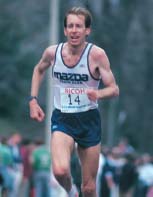
Bill Rodgers.
I love the history of the marathoners excellence, which the Boston Marathon personifies. I learned a sense of this history under the tutelage of 1968 Boston champion Ambrose Burfoot, who was a college cross-country and track teammate at Wesleyan College in Middletown, Connecticut, when he won. Ambrose had his own Boston marathon mentor in the person of John J. Kelly, who won in 1957. Mr. Kelly was Ambroses high school English teacher and cross-country coach. My point is that this Marathon has a special place in New England heartsand in the hearts of all committed marathoners both in the U.S. and around the world. One hundred and seven-teen years of consecutive races will do that for you. There is no other marathon with such a history of the worlds top marathoners racing over the same course. Thus Boston stands alone in that regard and, with its qualifying standards, it has become the equivalent of the Olympic marathon for the most committed of our runners.
This gem of a race has not made it to this point without growing pains. Some of these were quite well known: the Kathy Switzer/Jock Semple clash in 1967, the Rosie Ruiz charade in 1980, the rope-start tripping debacle of 1987, and the wheelchair crashes of 1987. These flaws in the race got worldwide attention because the race in Boston has always been at the forefront of the sport as it evolved.
In fact the race went from a 17th century trot to a 21st century professional athletes event in one year: 1986. That was the year that the race organizer, the Boston Athletic Association, agreed to the introduction of prize money, generously supplied by current title race sponsor John Hancock Financial Services. The Boston Marathon has become a far stronger and better-managed event ever since. Twenty-three thousand runners were at the starting line at Hopkinton in 2013, and almost all qualified by running other marathons in the same year under a specific time limit determined by ones age.
The runners who dont time qualify get their numbers in a unique and admirable manner: they raise money for one of 15 special race beneficiaries, such as the Jimmy Fund, Team Diabetes, or Special Olympics. These runners are making a strong effort of the most positive kind in our country. Theyre giving of themselves to help conquer diseases that may strike many of us. This program got its start under longtime race director Will Cloney, who worked with the MS Society beginning in 1975 to raise dollars in this method.
All of this is good. But would it exist today if Johnny Kelly hadnt had his heart broken when he lost the race on that big hill at the 21-mile mark near Boston College; if mighty Clarence DeMar hadnt won seven Bostons in his immutable manner in the twenties and thirties? Talk about the American individual standing alone and conquering all! He was the real Marathon Man, unafraid of all challenges, prepared to do his best facing the adversity that 26 miles of road presented.
And what of the great women at Boston! What of the then-world record race of Joan Benoit Samuelson of Maine in 1983? Would that have happened if Roberta Gibb hadnt become the first woman to run the Boston Marathon in 1965? What about the real champion of the 1980 Boston Marathon, the year Rosie Ruiz attempted to steal the race? If that was a low point, surely Jacqueline Gareaus gracious sportsmanship is a high point for all marathoners. Kenyas Margaret Okayo set a new course record in 2002. Catherine Ndereba of Kenya conquered the course four times. Could they have done this without Sara Mae Bermans (unofficial) win two decades earlier, when the women champions werent given the gold medal emblazoned with the Unicorn, symbol of the race and of the B.A.A.? Would there be an absolute takeover of the citys finest hotels and restaurants, as there is today on race day, if we hadnt been given a bowl of beef stew after the finish in the sixties and seventies? Would those fine, lithe Kenyans be running Boston today if 176-pound Joe Milkman Smith hadnt thrashed himself to win more than 70 years ago? Would there be a wheelchair competitors world championship at Boston today if Bobby Hall hadnt pushed to victory alone in a standard wheelchaira true pioneerin 1975?
Next page
